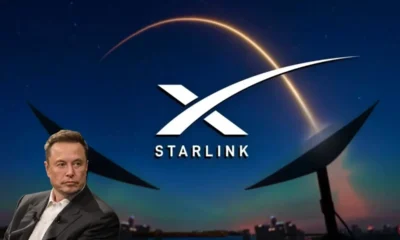Trends
Salvaging The $44 Billion Investment In X. Winds Of Change For Musk Amid His ‘Fix’ Mission Over High Support For Zelenskyy On X
Published
12 hours agoon

Elon Musk’s $44 billion acquisition of Twitter (now X) in October 2022 was one of the most talked-about business moves in recent history. The deal made headlines for months, even sparking debates over whether Musk had overpaid for the platform. What followed was a period of chaos—mass layoffs, policy overhauls, and an exodus of advertisers that sent X’s valuation plummeting. But now, two and a half years later, Musk might just be pulling off a near-miracle.
X’s Comeback
According to recent reports, X is in talks to raise funds at the same $44 billion valuation Musk initially paid. While negotiations are still ongoing and could fall apart, the very prospect of X reaching this valuation again is a remarkable turnaround.
One of the key reasons for this resurgence is the slow but steady return of major advertisers. After brands like Amazon and Apple distanced themselves from X due to concerns over hate speech and pro-Nazi content, the platform has taken steps to clean up its act. By making several controversial accounts ineligible for ads, X has managed to regain advertiser trust, marking a crucial step toward financial recovery.
Another positive sign – bondholders who were previously deep underwater have managed to offload billions of dollars in X-related debt at 97 cents on the dollar. The high interest rates still make this a risky bet, but it’s a clear indicator that confidence in X is growing.
xAI’s Role in the Revival
Musk’s AI company, xAI, is also playing a significant role in X’s financial turnaround. Reports suggest that X holds a stake in xAI, which is currently seeking a massive $75 billion valuation in its latest funding round. If xAI achieves that target, it could provide a strong financial cushion for X and boost its overall valuation.
Betting on Musk, Not Just. The Ultimate X Factor
While these financial and strategic shifts are important, the biggest reason for X’s resurgence is likely Musk himself. His influence extends far beyond the tech world—especially now that he has been given a special role in the Trump administration. As a ‘special government employee’ under President Donald Trump, Musk’s reach within the federal government has grown significantly, and that influence is being felt across his business empire.
With Trump back in office, X has once again become the go-to platform for political discourse. Musk’s vocal support for Trump, coupled with his criticism of progressive causes, has turned X into a pro-Trump stronghold. This has made X a must-watch platform for anyone wanting to track political developments, much like how Twitter was during Trump’s first presidency.
Therefore, investors eyeing X are likely placing their bets on Musk’s ability to leverage his government ties rather than the platform’s standalone business model. This mirrors what’s happening with Trump Media & Technology Group (the parent company of Truth Social), which boasts a market value of over $6 billion despite generating just $3.6 million in revenue for all of 2024.
Wedbush analyst Dan Ives put it bluntly, “The best thing that ever happened to Musk was betting on the Trump White House.” He even estimates that Trump’s reelection effectively doubled X’s valuation.

New Chips
X’s turnaround is stunning considering Fidelity, whose Blue Chip fund holds a stake in X, valued the company in October 2024 at just 20% of the $44 billion that Musk paid for it.
In the months following Musk’s Twitter purchase, he made the company virtually unrecognizable from its former self.
Musk laid off roughly 80% of the company’s staff, reversed a previous ban on then-former President Trump, reinstated the suspended accounts of White supremacists and conspiracy theorists, reshaped the “blue check” verification system in a way that made it harder to identify people on the platform, removed specific protections for transgender people from Twitter’s hateful conduct policy, elevated the “Community Notes” user-generated factcheck system to largely replace the company’s own moderation efforts, and publicly bullied advertisers that took their business elsewhere.
And Musk himself hasn’t been shy about tormenting X’s potential sources of revenue for leaving. In one extraordinary moment in the November 2023 DealBook Summit, Musk called out Disney CEO Bob Iger and told advertisers that left X to “go f**k yourself.” A week later, Musk said Iger should be fired for pulling Disney ads from X.
After the Center for Countering Digital Hate published reports critical of the platform’s response to hateful content, X sued the group, accusing it of deliberately trying to drive away X’s advertisers. CCDH — in addition to other researchers and online safety groups — had released a series of reports criticizing the company’s handling of hate speech, including providing evidence, for example, that anti-LGBTQ+ rhetoric had jumped under Musk’s leadership. It also said the platform was monetizing some previously banned but then reinstated accounts that were spreading hateful content.
A federal judge ultimately tossed the lawsuit, arguing that the case — brought by X and its leader who has called himself a “free speech absolutist” — was aimed at “punishing” the non-profit group “for their speech.”
Musk said when he bought Twitter that it was a financially troubled company that needed to allow more “free speech” and to become a kind of “everything app” — similar to Weibo and WeChat — a centralized platform for payments, e-commerce, entertainment, news, and communication.
Although X has made some progress, including announcing a partnership with Visa last month to offer digital wallets, it’s nowhere close to realizing that dream — in large part because Musk’s controversial moves both within and outside of the company have repeatedly caused trust issues for users and advertisers. And even some of X’s longtime features, like the audio conversations tool Spaces, continue to suffer major glitches in high-profile moments.
Still, Musk’s dramatic cost-cutting at X may have improved the company’s margins and improved its profitability, potentially bolstering its value, said D.A. Davidson’s head of technology research Gil Luria. But, Luria added, it’s hard to tell since Musk took the company private and no longer must publish its financial results.
The prominent advertisers that have made their way back to X in recent weeks may be doing so as part of a broader effort by tech leaders to gain favor with Trump and his allies. But it’s unclear whether they’ll stick around through any future risks to their reputations.
And although X may be having a moment, in the long run, it faces far more competition from the rival platforms that have cropped up since Musk bought the bird app.

X Needs To Be ‘Fixed’
Elon Musk has pledged to “fix” X’s fact-checking tool following the release of polling contradicting United States President Donald Trump’s claim that Ukrainian President Volodymyr Zelenskyy is deeply unpopular in his country.
Rowing in behind Trump’s attacks on Zelenskyy, Musk claimed that his social media platform’s “Community Notes” feature was being “gamed” by governments and traditional media.
Musk made the claim while amplifying an anonymous right-wing X account that questioned the credibility of a widely cited Ukrainian polling outfit because of its work with the US Agency for International Development (USAID), which is being effectively dismantled under the billionaire’s cost-cutting drive.
“If Zelensky was actually loved by the people of Ukraine, he would hold an election. He knows he would lose in a landslide, despite having seized control of ALL Ukrainian media, so he canceled the election,” Musk said on X, while sharing the unsubstantiated claim that US intelligence agencies estimate Zelenskyy’s approval to be just 4 percent.
“In reality, he is despised by the people of Ukraine, which is why he has refused to hold an election,” Musk said, referring to Zelenskyy’s decision to suspend elections after declaring martial law in the wake of Moscow’s 2022 invasion.
“I challenge Zelensky to hold an election and refute this. He will not.”
Musk, one of Trump’s most powerful allies as the head of the Department of Government Efficiency (DOGE), did not provide evidence of manipulation of X’s Community Notes system, which attaches explanatory notes to contentious posts based on the consensus of users.
The Last Bit
Some have described Musk’s comments as extremely concerning. As is often the case with this kind of rhetoric, the accusations are a guide to what we have to look out for from the accuser – a world where private platforms like X can be systematically gamed to favor the political interests and alliances of their owners.
For the platform, despite the optimism , challenges remain. X is still working to rebuild its ad revenue, and competition from platforms like TikTok and new Twitter alternatives is fierce. However, Musk’s strategic positioning—both in business and politics—suggests that X is far from done.
For now, X appears to be riding the winds of change, and if Musk’s bets continue to pay off, he might just salvage the $44 billion he once spent on what seemed like a sinking ship.
You may like
-


After A Tough Year In China, And Plummeting Sales, Can Tesla’s India Gamble Steer It Back On Track Amid Musk’s Controversies?
-


From 14 States Suing DOGE To Musk’s Agenda Of Deleting Entire Federal Agencies—DOGE Has Emerged Un-Able To DOGE Drama!
-


Layoffs Are Back. JPMorgan, Chevron, And More—Why Across All Sectors Nearly Half Of Companies Expect Job Cuts In 2025?
-


First No And Now Yes, Ontario Pauses Threat To Musk’s $100M Starlink Deal As Trump Offers Tariff Concessions – Why The EU Wants To Wean Itself Off Musk’s Projects
-


Elon Musk’s Bold Bet, Big Win As Amazon Returns, Sues Other Major Brands Over Ad Boycott. Can Legal Action Revive X’s Ad Revenue?
-


Elon Musk To The Rescue? Nasa Astronauts Stuck In Space May Finally Be ‘Earth Bound’ Thanks To Trump’s Directive. But Musk’s SpaceX Was Already On The Job, Why Is There Confusion?
